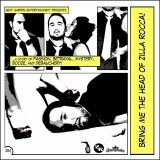Something is wrong here, something is terribly wrong
 Art by THANKS Welcome to snippet culture. With the click of a few buttons, you can get your news pre-sliced, your art pre-chewed, and your opinions predigested. Follow a YouTube link of a talk show clip to an excerpt of a thinkpiece retort to a real-time message-board backlash. For better and/or worse, we're living on scraps, soundbites, and hype(r)links these days. We've forgone phone calls for four-word texts and newsfeeds for actual updates from friends. It's a field full of teal deers, where we're more widely informed but only as deep as the headlines. Blah blah blah etc etc etc. If you've read this far, you may have noticed that cultural criticism is a tough thing to do. Registering your points can mean coming off as didactic or out-of-touch or hopelessly traditional. Or even worse yet, boring. So yeah, it's getting pretty clear we're oversaturated and that our attention spans are fraying under all this stimuli. But the more important question then becomes how to present that information in a potent and meaningful way. How to resonantly reflect your times, and yet produce something of lasting substance. The answer for many musicians nowadays is to make snippet music. In the last decade, we've seen great work from sample connoisseurs such as The Avalanches, The Books, and Girl Talk. In their own distinctive ways, they've made piecemeal collages that evoke the past but sound fiercely present. Voraciously consuming and processing data, they've shown little respect for genre boundaries or conventional contexts. And with information becoming more liquid by the minute and mixing technology ever-advancing, it also increasingly makes sense from a technical standpoint. However, if one man epitomizes the heights of snippet music, it'd have to be Steinski (né Steven Stein). Long a bootlegged, namedropped pioneer, he's finally getting his mass-market due with Illegal Art's new What Does It All Mean?: 1983-2008 Retrospective. At first, I was skeptical this album could stand up to the years of hype I'd heard, but it easily exceeds all of my expectations. At its core level, it's a monumental tour through hip-hop history. In Steinski's and partner Double Dee's classic first work, a remix contest entry called "Lesson 1 - The Payoff Mix," you can feel just how kinetic and fresh early rap sounded. You can hear the deep love they invested in each meticulously chosen ingredient. But just as remarkable is how indelibly it inspired future innovators like DJ Shadow and Cut Chemist, who both paid homage with their own early '90s Lessons. After taking on old-school hip-hop, Steinski extended his sensibility in more explicitly political directions. In 1987, he created "The Motorcade Sped On," his take on the JFK assassination. It's a brave--and brazen--topic to address, but if the song's treatment seemed flippant at the time, it sounds downright appropriate today. Steinski's reliance on quick cuts and gratuitous loops are a perfect representation of the 24-hour news cycle. Observations both gain and lose meaning as they're subjected to constant repetition. The moments of real, shocking tragedy are buffeted between a funky drum break (from the Rolling Stones' "Honky Tonk Woman") and initiated by pop-culture punchlines (Ed McMahon's "Heeeeeeeeere's Johnny" and Kennedy's "Ich bin ein Berliner.") Steinski even darkly equates gunshots with drumbeats, further flattening the event. And yet in this reconstructed version, it's hard not to feel affected. The overload of effects creates a sense of chaos, and the leapfrogging between playfulness and horror makes the latter even more disarming. Hearing Walter Cronkite stuttering to make sense of the situation makes its own kind of messy sense. What at first seems offensive begins to feel like a 21st century tribute. It most closely resembles channel-surfing during a major news event--seeing the same flickers of images repeating across the dial, hearing every talking head regurgitating the information thus far, watching the scene play out from different camera angles. To get our heads around something as scarring as assassination, Steinski has to break it down first. He has to put his own personal spin on a massive act to effectively address it. Interestingly, Steinski's subject is pretty much ideally suited for that treatment. At a time when a television in every home was still somewhat novel, the Kennedy assassination was, before the moonwalk, the preeminent image in the national consciousness. Yet, because everyone experienced it a little differently, every American could construct his own individual narrative. With the Zapruder home video, the act took on even more overt subjectivity and shared iconography. (Consider Don DeLillo's Underworld, in which the characters attend a party with hundreds of TVs playing the video on a continuous loop.) And with the rampant conspiracy theories, no other 20th-century moment has been as exhaustively dissected, jumbled and reassembled. Beyond its immediate implications, Kennedy's death essentially exploded the notion of a neat, linear-threaded history. On its own terms, "The Motorcade Sped On" is a strange, jarring take on a searing event. But heard in a grander scope, it plays like a harbinger of our current climate. Steinski's music isn't just present but prescient. It doesn't just comment on the message, but turns the medium inward on itself. Beyond breaking new ground at the time, What Does It All Mean? is essential because it manages to sound even more relevant twenty-one years later. It positions Steinski not just as an important figure of his era, but, in this cut-and-paste culture, an artist that deserves to stand apart as one of the all-time legends. Up next: Part 2 of my Steinski writeup, discussing "It's Up To You" * MP3: "The Motorcade Sped On" - Steinski from What Does It All Mean?: A 1983-2006 Retrospective [Buy it] * Website: Steinski |





















Comments on "Something is wrong here, something is terribly wrong"
-
 yivgames said ... (1:54 AM) :
yivgames said ... (1:54 AM) :
post a commentThanks for sharing such a nice article. It is really useful to me and all people. yiv games mobile|yiv games mobile